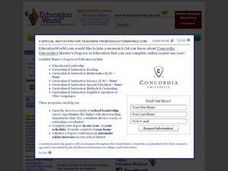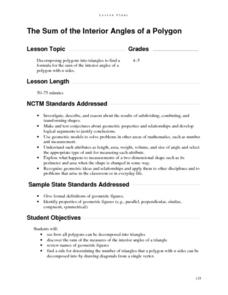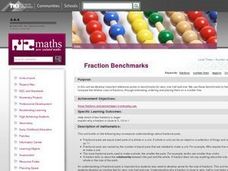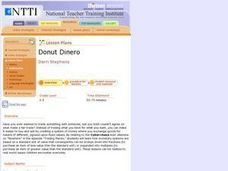Learn NC
Peanut Butter and Jelly and Order of Operations
Study order of operations using a peanut butter and jelly sandwich activity as your guide. The class watches you make a peanut butter and jelly sandwich based on a volunteer's instructions. They discuss the importance of following...
Curated OER
What's in a Shape?
Students explore characteristics of shapes by making and using tangram sets. They discover how the tangram pieces are related to one another, and determine how many different combinations of the triangles, squares, and parallelograms in...
Curated OER
Holiday Greeting Cards: A Graphing Activity
Pupils examine statistics about the popular type of greeting cards and create pie or bar chart using an online tool. They illustrate the sales statistics for the greeting cards before making the charts.
Curated OER
Reality Store: How to Plan a Budget, Pay Bills, and Manage Your Money
Students plan a budget and pay bills when they visit the "Reality Store," a series of classroom studying stations. The use of paying bills and running a class store is used to help students grasp the concept of business.
Improving Measurement and Geometry in Elementary Schools
The Sum of the Interior Angles of a Polygon
Junior geometers discover that polygons can be decomposed into triangles and that the number of triangles can be determined by a rule. Note that the Geometer’s Sketchpad® software is required to carry out all components of this...
Curated OER
Fraction Benchmarks
Learners investigate the fraction benchmarks for zero, one half, and one. They use these benchmarks to compare the relative sizes of fractions, through estimating, ordering and placing them on a number line. An assessment worksheet is...
Curated OER
Fractions
Fourth graders use pattern blocks and fraction identification cards to create and identify fractions. In this fractions lesson plan, 4th graders identify fractions in a pizza, and make fractions with markers.
Curated OER
Reflections of Symmetry
Students use video and the Internet to identify examples of bilateral and radial symmetry in the world around them. They create symmetrical reflection designs using pattern blocks and paper.
Curated OER
Triangles
Fourth graders participate in three experiments to gain understanding of triangles. In this triangles lesson, 4th graders use pipe cleaners to create bubble pipes, basketball hoops and bingo cards to display the characteristics of...
Curated OER
I'll Halve S'More, Please!
Students describe a fraction in terms of sharing parts of a whole. They understand the meaning of the parts of a fraction and add and subtract like fractions. They apply fractions to problem situations and recognize and use equivalent...
Curated OER
Making Simple Conversions
Fourth graders explore unit conversions. They create visual models of measurement units, identify tables of equivalent units and make simple conversions with in a measurement system. Students produce charts that identify units of measure...
Curated OER
The Fibonacci Sequence Through Art Lessons
It is easy to combine math and arts lessons to create motivating and interesting activities.
Curated OER
Give Me the Money
Young scholars view a money transaction on video and identify the steps involved in making a purchase and calculating change. They write out original money math problems and exchange them with classmates.
Curated OER
Compare Human-made Objects with Natural Objects
Students examine and observe how many human-made objects get their basic design from things in nature. They listen to the book "Nature Got There First," compare/contrast hollow bones with drinking straws, bird beaks and tool pliers, and...
Curated OER
Weather Dot Com
Students examine the need for a standard unit of temperature and measure temperature with a thermometer. They discuss the details of a thermometer and the calibrations used, record temperature data for inside and outside, explore...
Curated OER
The Five Number Game
Students explain what it means to square numbers. They explain what it means to cube numbers. Students define prime numbers using their own language. They are introduced to the problem by playing one game as a class.
Alabama Learning Exchange
Simple Machines
Young scholars watch a video and play a game. In this simple machines lesson, students watch a video on simple machines. They play an interactive game on the Edheads web site and share what they have learned. Throughout the day young...
Curated OER
Are We Couch Potatoes or Busy Bees? Data Analysis of Physical Activity in School
Young scholars study practical data analysis within the constraints of the scientific method. For this data lesson students collect and enter data into a computer spreadsheet then create graphs.
Curated OER
Leaping!
Students properly leap and measure their distance. For this leaping lesson, students practice leaping for accuracy and proper form. Students estimate their leaps and measure with rulers. Students determine distance covered by the entire...
Curated OER
Teaching Fundamental Movement
Students perform fundamental movement activities for flexibility and motor skills. In this movement lesson plan, students perform physical activity for all grade levels.
Curated OER
Equivalent Fractions
Students complete a worksheet. For this fractions lesson, students review their knowledge of fractions, define equivalent fractions, see examples of equivalent fractions and practice making equivalent fractions.
Curated OER
Donut Dinero
Students set up a classroom currency exchange and explore the idea of bartering to get what they want. They create a monetary unit that is based on fractions and multiples of a standard unit, and compare this system to the U.S. monetary...
Curated OER
Mapping with a Compass: A Simulated Survey
Students use compasses and grids to map the locations of artifacts found in a simulated dig site. In groups, they role-play as future archeologists excavating a school site. Groups begin at their assigned datum and site the artifacts...
Curated OER
Coordinate Grid: Mapping Archeological Sites
Fourth graders discover how to apply the Cartesian coordinate system by figuring out the length and width of their school playground. They determine that pacing is an important tool for the initial mapping of a site. Students conduct a...
Other popular searches
- Everyday Mathematics Arrays
- Everyday Mathematics Review
- Everyday Mathematics Mixed
- Everyday Mathematics Dominos
- Everyday Mathematics Page 38























